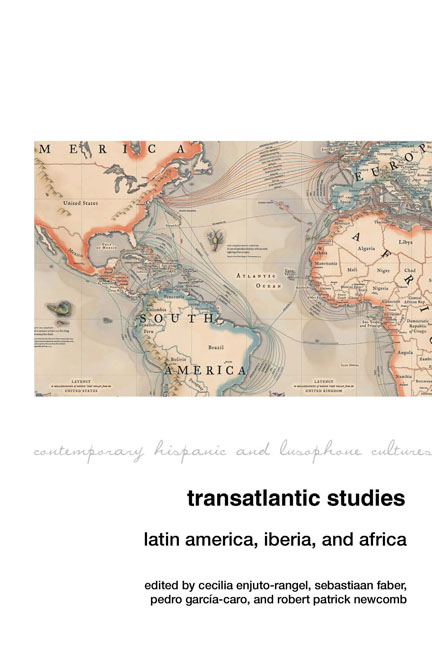Book contents
- Frontmatter
- Contents
- Introduction: Transatlantic Studies: Staking Out the Field
- Transatlantic Methodologies
- Transatlantic Linguistic Debates
- Transatlantic Displacement
- Transatlantic Memory
- Transatlantic Postcolonial Affinities
- Transatlantic Influence
- Epilogue: The Futureâif There Is OneâIs Transatlantic
- Index
11 - The Transatlantic Trajectory
- Frontmatter
- Contents
- Introduction: Transatlantic Studies: Staking Out the Field
- Transatlantic Methodologies
- Transatlantic Linguistic Debates
- Transatlantic Displacement
- Transatlantic Memory
- Transatlantic Postcolonial Affinities
- Transatlantic Influence
- Epilogue: The Futureâif There Is OneâIs Transatlantic
- Index
Summary
Transatlantic Studies in the twenty-first century continues to be a field under construction. The critical practices of the previous century were defined by their genealogical or teleological authority or by a desire for truth. Transatlantic Studies, in contrast, is marked by its inclusive character, dialogic methodology, and anti-canonical goals. The field's academic protocols and future potential have emerged clearly from the seven international conferences organized by the Transatlantic Project at Brown University (2000–13), the six annual transatlantic “jornadas” at the universities of Barcelona, Granada, and País Vasco, and also at the Casa de América, Madrid, as well as our bi-annual international conferences at universities in Lima, Monterrey, Havana, Santiago de Chile, and Buenos Aires. What has emerged from these meetings and the materials they generated is the hypothesis of an all-inclusive approach to literature capable of recovering the ethical and critical quality of academic dialogue.
Transatlantic Studies postulates a nomadic inscription in the humanities as a global field. It permanently questions any Republic of Letters or, rather, aims to keep that Republic current. Likewise, the conferences that several universities in Latin America and Europe have dedicated to the Atlantic interconnectivity shaping their national literatures—at the Universidad Complutense in Madrid and at the universities of Puerto Rico, Guadalajara, Havana, Granada, Barcelona, the Católica in Lima, and the Católica in Santiago de Chile—have served to reveal triangulations and transborder dynamics that help undermine the tendency towards monologue and hierarchy that have marked academic readings of national literary archives.
In addition, a group of specialists in the Baroque has been especially productive at the University of Western Ontario, Canada; the Universidad Nacional de La Plata is seeing an Atlantic revision of traditional Argentine criticism; and at the Université de Paris Nanterre another group is dealing with Atlantic literary historiography. The Université de Louvain has groups working on the transatlantic essay, reception, and new genres. And at the University of Cologne, Gesine Müller is leading a long-term project on the global spread of Latin American literature. New members of this constellation include an interdisciplinary group of young scholars at Harvard; and another, at the University of Ghana, is dedicated to the triangulation of Africa, Spain, and the Americas.
- Type
- Chapter
- Information
- Transatlantic StudiesLatin America, Iberia, and Africa, pp. 144 - 147Publisher: Liverpool University PressPrint publication year: 2019



